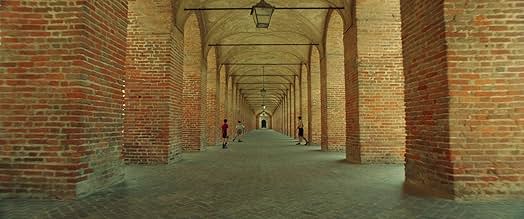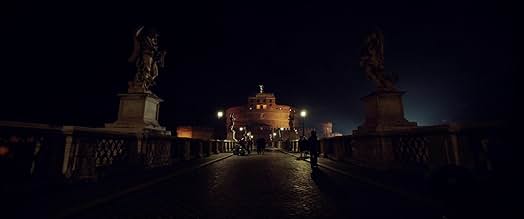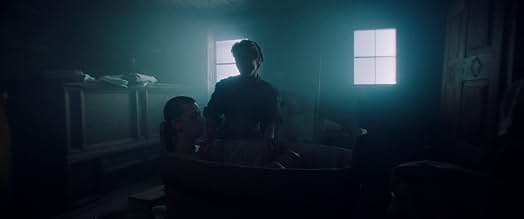VALUTAZIONE IMDb
7,0/10
1856
LA TUA VALUTAZIONE
Antonio Ligabue viene espulso dalla Svizzera in Italia. Per anni vive in povertà nelle pianure alluvionali del Po, ma non rinuncia mai alla sua passione per il disegno come un solitario rivo... Leggi tuttoAntonio Ligabue viene espulso dalla Svizzera in Italia. Per anni vive in povertà nelle pianure alluvionali del Po, ma non rinuncia mai alla sua passione per il disegno come un solitario rivoluzionario nell'arte moderna.Antonio Ligabue viene espulso dalla Svizzera in Italia. Per anni vive in povertà nelle pianure alluvionali del Po, ma non rinuncia mai alla sua passione per il disegno come un solitario rivoluzionario nell'arte moderna.
- Regia
- Sceneggiatura
- Star
- Premi
- 18 vittorie e 19 candidature totali
Recensioni in evidenza
An astonishing portrait of a great artist who was very unique and suffered from mental illness.A great performance by the leading actor. A very sentimental film. Highly recommended. His paintings reminded me of Van Gogh.
As of when I write this review, the film has a 5.8 rating, totally unrealistic and unfairly low (I suppose it was mostly downvoted by people too used to commercial comedies or action films).
A very unconventional biopic, it reminds me partly of At Ethernity's Gate, although it manages to be a thing of its own.
Rather than presenting Antonio Ligabue's life (which actually it does in its completeness), it constructs the story around the character. The non-linearity thus is unconventional and very appealing. I already knew about Elio Germano's undisputed talent so his performance was expectedly outstanding, and I hope it will be further recognised outside the Berlin Film Festival. So far, this movie definitely deserves to be among the best of the year, and is proof that there's still fresh sap in international and italian cinema, despite the poor marketing that undermines such efforts (this film is almost virtually unknown. I had to travel 40 mins because my three local cinemas wouldn't screen it).
I find the film offer too anemic... empty, silly, repetitive, violent, warlike, obsessive, addicted to everything that hurts us as human beings. Too much Los Angeles. Complaining about it doesn't improve the offer, but I insist because there has always been another cinema, which might be for minorities, an acquired taste or "independent", but it is far from people's access, whose palate has been shaped by TV, smart phones, ad agencies and families obsessed with Disney, religion and sex.
This flow of ideas came to me when I finished watching the Italian film «I Wanted to Hide», a biographical drama about Antonio Ligabue, one of the greatest naive painters of the 20th century. Born in Switzerland, he ended up expelled in Italy, where he wandered along the banks of the Po. He began to paint at age 21 and, despite his madness and raptures, he managed to create a solid, forceful world of vivid colors. Ligabue was one of a kind, unique, he screamed, danced, howled, imitated the animals he painted, in a hostile milieu, surrounded by people who did not care about his pain, his suffering, his art.
Still, Ligabue found friends, and critics and colleagues who understood and helped him achieved public recognition while alive, even as the subject of a documentary. My only objection is the late retelling (perhaps in tune with the order of real events) of his unhappy attempt to live with the woman he loved. Distant, observant, the painter even wore feminine garments in private, to try to suppose the essence of a woman. His unfortunate encounters occur in the near-final part of the film, somewhat delaying its poignant closure.
I think it is obligatory to emphasize several aspects of this motion picture: first, the script, which recounts Ligabue's life in a fragmented way, keen of his schizophrenic perceptions, until he "finds peace" and the script follows narrative chronology; second Matteo Corro's cinematography, which operates as a mirror of Ligabue's expressive, colorful and vivid work in oil and ceramic; third, Elio Germano as the artist, in a performance which earned him the Best Actor award at the Berlin Film Festival, a portrayal free from mannerisms or hackneyed resources of the "method"; and fourth, the mise-en-caméra of director Giorgio Diritti, who took advantage of all these technical and artistic elements.
Ludovica Ferrario's work in production design is also worth mentioning, especially for the selection of spaces and locations that magnify the aesthetic value of Corro's image; and finally the musicians Daniele Furlati and Marco Biscarini (also sound designer), who give a delicate lesson in sound and music scoring, sometimes imperceptible, at the right moments, in contrast to the grotesque tendency to fill the soundtrack with sound effects and strident music from mainstream American cinema and its imitators.
For all these merits, «I Wanted to Hide» won Italy's highest film award, the David di Donatello, for Best Film, Director, Actor, Cinematographer, Art Direction, Hairstyling and Sound.
This flow of ideas came to me when I finished watching the Italian film «I Wanted to Hide», a biographical drama about Antonio Ligabue, one of the greatest naive painters of the 20th century. Born in Switzerland, he ended up expelled in Italy, where he wandered along the banks of the Po. He began to paint at age 21 and, despite his madness and raptures, he managed to create a solid, forceful world of vivid colors. Ligabue was one of a kind, unique, he screamed, danced, howled, imitated the animals he painted, in a hostile milieu, surrounded by people who did not care about his pain, his suffering, his art.
Still, Ligabue found friends, and critics and colleagues who understood and helped him achieved public recognition while alive, even as the subject of a documentary. My only objection is the late retelling (perhaps in tune with the order of real events) of his unhappy attempt to live with the woman he loved. Distant, observant, the painter even wore feminine garments in private, to try to suppose the essence of a woman. His unfortunate encounters occur in the near-final part of the film, somewhat delaying its poignant closure.
I think it is obligatory to emphasize several aspects of this motion picture: first, the script, which recounts Ligabue's life in a fragmented way, keen of his schizophrenic perceptions, until he "finds peace" and the script follows narrative chronology; second Matteo Corro's cinematography, which operates as a mirror of Ligabue's expressive, colorful and vivid work in oil and ceramic; third, Elio Germano as the artist, in a performance which earned him the Best Actor award at the Berlin Film Festival, a portrayal free from mannerisms or hackneyed resources of the "method"; and fourth, the mise-en-caméra of director Giorgio Diritti, who took advantage of all these technical and artistic elements.
Ludovica Ferrario's work in production design is also worth mentioning, especially for the selection of spaces and locations that magnify the aesthetic value of Corro's image; and finally the musicians Daniele Furlati and Marco Biscarini (also sound designer), who give a delicate lesson in sound and music scoring, sometimes imperceptible, at the right moments, in contrast to the grotesque tendency to fill the soundtrack with sound effects and strident music from mainstream American cinema and its imitators.
For all these merits, «I Wanted to Hide» won Italy's highest film award, the David di Donatello, for Best Film, Director, Actor, Cinematographer, Art Direction, Hairstyling and Sound.
Hidden Away (*Volevo nascondermi*) is a poignant and visually striking biopic that delves into the life of Antonio Ligabue, an eccentric and misunderstood figure in modern art. Directed by Giorgio Diritti, the film captures Ligabue's struggles with poverty, isolation, and his unrelenting passion for painting, offering a deeply empathetic perspective on the challenges of genius.
Elio Germano delivers a monumental performance as Ligabue, fully immersing himself in the role with an astounding level of physical and emotional commitment. His ability to convey the artist's torment, joy, and idiosyncrasies elevates the film into a deeply moving character study. Germano's portrayal is a masterclass in mimesis, blurring the lines between actor and subject in a way that feels almost otherworldly.
Diritti's direction stands out for its originality, with a poetic and often impressionistic approach that mirrors Ligabue's art. The cinematography beautifully captures the desolation of the Po floodplains, juxtaposing the harshness of Ligabue's surroundings with the vivid, otherworldly colors of his paintings. The script, while minimalistic, allows the visuals and Germano's performance to take center stage, creating an immersive and meditative experience.
Hidden Away is not just a biopic but a celebration of resilience and creativity in the face of adversity. It's a film that resonates deeply, offering a glimpse into the soul of an artist who found beauty in the margins of life.
8/10 - an original and profoundly moving tribute to the power of art and individuality.
Elio Germano delivers a monumental performance as Ligabue, fully immersing himself in the role with an astounding level of physical and emotional commitment. His ability to convey the artist's torment, joy, and idiosyncrasies elevates the film into a deeply moving character study. Germano's portrayal is a masterclass in mimesis, blurring the lines between actor and subject in a way that feels almost otherworldly.
Diritti's direction stands out for its originality, with a poetic and often impressionistic approach that mirrors Ligabue's art. The cinematography beautifully captures the desolation of the Po floodplains, juxtaposing the harshness of Ligabue's surroundings with the vivid, otherworldly colors of his paintings. The script, while minimalistic, allows the visuals and Germano's performance to take center stage, creating an immersive and meditative experience.
Hidden Away is not just a biopic but a celebration of resilience and creativity in the face of adversity. It's a film that resonates deeply, offering a glimpse into the soul of an artist who found beauty in the margins of life.
8/10 - an original and profoundly moving tribute to the power of art and individuality.
Lo sapevi?
- QuizFrench certificate # 154173.
I più visti
Accedi per valutare e creare un elenco di titoli salvati per ottenere consigli personalizzati
- How long is Hidden Away?Powered by Alexa
Dettagli
Botteghino
- Lordo in tutto il mondo
- 1.031.622 USD
- Tempo di esecuzione2 ore
- Colore
- Proporzioni
- 2.39:1
Contribuisci a questa pagina
Suggerisci una modifica o aggiungi i contenuti mancanti

Divario superiore
By what name was Volevo nascondermi (2020) officially released in Canada in English?
Rispondi
![Guarda Trailer [OV]](https://m.media-amazon.com/images/M/MV5BNTE5MTVkZmEtYmY3YS00ODU3LTg3ZDAtOGE4MWIyNzBjOTBlXkEyXkFqcGdeQXRyYW5zY29kZS13b3JrZmxvdw@@._V1_QL75_UY281_CR86)





















